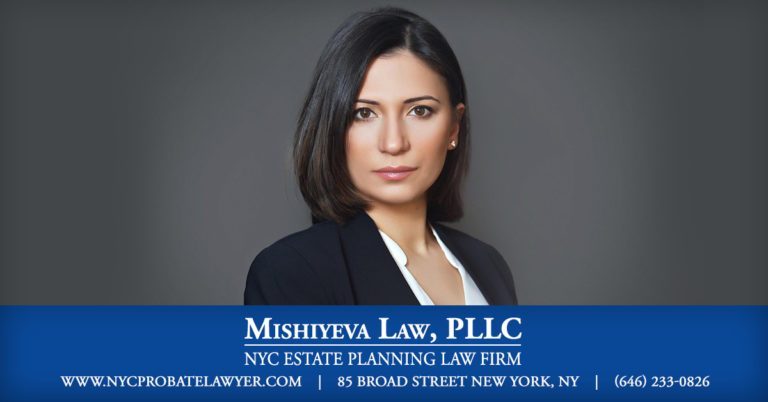New York Trusts
 NYC Trust Attorney
NYC Trust Attorney
Estate planning is NOT an area of financial planning that is reserved only for the rich and wealthy. My law firm has had the pleasure of meeting clients from all walks of life. From the uber-rich to the five-borough middle class client, several estate tools that I have offered overlapped throughout all of the various economic classes. What many fail to understand is with the proper estate planning techniques, namely using trusts, you may be able to qualify for public programs such as social security and Medicaid. To assume that a trust is a tool meant only for the top 1% is a mistake. The general public is unfortunately unaware how effective a trust can be for everyday hard-working New Yorkers. If you own even one property, operate a business, or maintain a savings account, a New York Trust may be an appropriate instrument to add to your estate plan.
Mishiyeva Law, PLLC., our law firm which concentrates on New York Trusts, Probate, and Estate matters, can provide you and your family with a trust, be it revocable or irrevocable. With a trust, assets are managed and distributed by a third party called a trustee. Based on the directives of the grantor (the person who created the trust), the trustee distributes the assets to the beneficiaries.
Types of Trusts
There are various types of trusts but the main distinction between all of them is whether or not the trust is revocable or irrevocable.
Revocable trusts:
- Can be changed and altered by the grantor as many times as they wish
- Can be cancelled by the grantor at any time
- Avoids probate proceedings which are overseen by your local Surrogate’s Court
- Avoid guardianship proceedings since you can name a guardian for your minor dependent
- Retain your privacy as opposed to making the distribution of your assets of public record through probate
Downside of revocable trusts: You do not relinquish your ownership of the assets within the trust. This would mean that estate taxes, income taxes, and creditor liabilities would still be due on you as the grantor.
Irrevocable trusts:
- Relinquish your ownership of all property and assets in the trust which decrease your taxes (income and estate)
- Can be used as a powerful tool to deplete one’s net worth and income in order to qualify for Medicaid and other government programs and benefits
- Avoids probate proceedings and guardianship proceedings
- Retains the privacy of your assets and their distribution
- Stops creditors from putting a lien on your property
Downside to irrevocable trusts: Once it is created, it cannot be altered or terminated.
Trusts Can Save Your Family Time and Money
Allow me to give you a clear example of why utilizing a trust can save you time and money:
I had consulted with a would-be client who I will call Jill in order to keep her matter confidential. Jill had a son named Jack and a daughter named Jane.
Jill had a last will and testament drafted by a non-attorney. The will was not drafted according to to the requirements as set forth in the New York Statute pertaining to the execution and ceremony of will signings. Within Jill’s will, she wanted all of her assets to go only to Jack. Jane was left out of the will.
When Jill approached me to review the will, I informed her that the way the will signing was done would not pass the legal standard if the last will and testament would ever be challenged in probate court. Jill wanted to come back a few months later and have my firm make her a new will. Since Jane would have every intention to challenge a will, I informed Jill that a trust may be more appropriate since the probate process would be avoided (which is discussed in more detail here).
Jill, unfortunately, did not have a chance to make a new will and passed shortly after. The only will that was drafted was filed with Surrogate’s Court. Jane had to be notified of the will on file, and immediately hired an estate lawyer to challenge the document. As I had expected, the will did not stand up to the legal threshold set forth by statute. Since the will was now considered invalid, the estate of Jill had to be split between Jack and Jane.
If a trust were set in place, Jill’s decision to give all of her assets to Jack would not be a matter of public record. Jack would also never have to incur all of the legal fees, days off of work, and stress if a trust was utilized instead of a last will and testament.
Contact a New York Trust Lawyer Today
If you and your family are interested in setting up a trust, please reach out to my law firm at (646) 233-0826. As a Trust Lawyer in NYC, we represent clients in Brooklyn, Queens, Manhattan, Bronx, Staten Island, and Manhattan. Our law firm is located in the heart of the Financial District in NYC at 85 Broad Street 18th Floor, New York, NY 10004.
Attorney Advertising. This page is designed to provide general information. It is not intended to be legal advice. It can not and should not be substituted for proper legal representation. You should consult an attorney for legal advice regarding your rights as every case is unique and requires in depth analysis and preparation. Do not submit confidential information through this website. Contact initiated through this website does not create an attorney-client relationship. We make no warranty or guarantee of the accuracy or reliability of information contained herein.